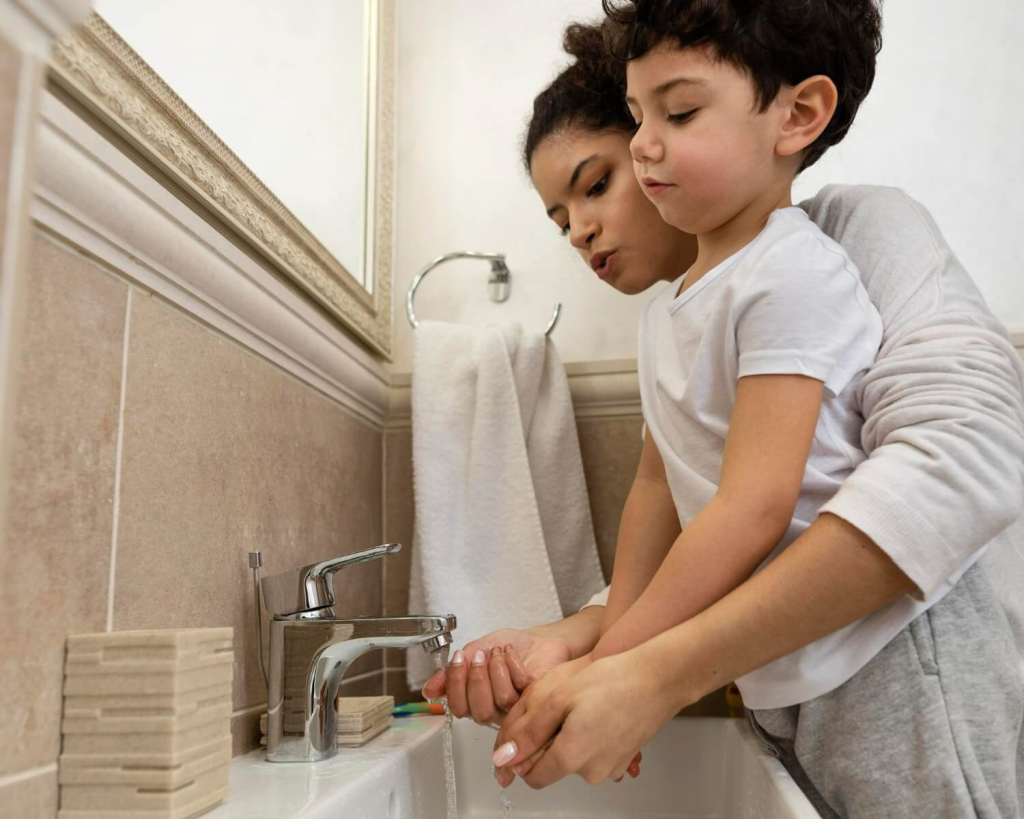
Raising healthy kids goes beyond simply ensuring they eat nutritious meals or play outdoors. It’s about helping them develop healthy habits for kids that nurture their physical health, emotional well-being, and long-term happiness. By instilling these good habits early on, parents set their children up for success—physically, mentally, and socially—throughout life.
Below are ten healthy habits every family can start incorporating today to help children grow stronger, more confident, and full of vitality.
Encourage Healthy Eating Habits and a Balanced Diet
Healthy eating habits start with what a child eats daily. From fruits and vegetables to lean meats, whole grains, and dairy products, a balanced diet is essential for good health and proper development. Introduce healthy foods at a young age and make mealtimes enjoyable rather than stressful.
To make healthy eating natural, involve your kids in preparing healthy meals. Let them pick colorful fruits, read the nutrition facts label, and help set the table. When children understand what goes into their food, they become more mindful of what they eat and are less likely to make unhealthy choices later on.
Parents should model healthy eating by sitting down with their kids to eat meals together. When children see parents making a healthy choice, such as adding more fruits and vegetables or drinking water, they are more likely to follow suit. Studies show that most children who share at least one meal daily with their families tend to develop better eating habits and stronger family bonds.
A healthy breakfast—such as oatmeal with fresh fruit or eggs with whole-grain toast—can improve academic performance and energy throughout the day. Always encourage drinking water instead of sugary drinks to maintain a healthy weight and protect against chronic diseases like heart disease and diabetes.

Promote Daily Physical Activity as a Healthy Habit for Kids
Physical activity plays a vital role in children’s overall well-being. It strengthens muscles and bones, promotes healthy weight management, and enhances mental health by reducing stress and anxiety.
Encourage your kids to stay physically active for at least one hour a day. This can include team sports, outdoor play, or simple fun ways to move like dancing, cycling, or jump rope. Not all children enjoy competitive sports—some may prefer individual activities such as swimming, hiking, or yoga. The goal is consistency and enjoyment.
Parents can also model healthy behaviors by joining their children in physical activities. A family walk in the evening or weekend bike rides create bonding opportunities and reinforce that being active is part of your whole family’s daily routine.
Encourage your kids to play sports not only for fitness but also to develop teamwork and discipline. Setting aside dedicated time children can spend outdoors or at sports clubs helps them appreciate the importance of regular physical activity in a fun way.
Prioritize Enough Sleep for Children’s Health
Adequate sleep is one of the most overlooked but essential healthy habits for kids. When children get enough sleep, their brains and bodies recover, supporting growth, memory, and emotional balance. The amount of sleep children need depends on his or her age, but maintaining consistent bedtime routines helps ensure they meet those hours every night for optimal rest and recovery.
For school-aged children, aim for 9–12 hours of quality sleep each night, while younger children may need more. A calm bedtime routine—turning off screens, dimming lights, and ensuring the child’s bedroom is quiet—can make a significant difference.
Sleep-deprived children may struggle with attention, mood swings, and even weight gain. Encourage them to avoid caffeine and heavy meals before bedtime. With proper rest, kids wake up refreshed and ready for school and play.

Set a Good Example in Maintaining Proper Hygiene and Personal Care
Teaching children about personal hygiene is another cornerstone of healthy habits. Simple routines such as brushing teeth twice a day, washing hands before eating, and bathing regularly prevent health issues and build self-confidence.
Even younger children can learn to wash their hands properly, cover their mouths when sneezing, and use their towels and toothbrushes responsibly. These good habits become building blocks for a lifetime of wellness and respect for their bodies.
Limit Screen Time and Added Sugar
Today’s children spend more time on digital devices than ever before, which can impact physical health, mental health, and academic performance. Excessive screen time contributes to unhealthy choices like skipping physical activity, late-night gaming, or overeating snacks with lots of added sugar.
Set clear screen-time limits based on your child’s age and encourage fun alternatives such as reading, crafts, or outdoor play. When children learn that balance is key, they’ll be better at managing time between studies, recreation, and rest.
Parents can also help by keeping devices out of the child’s bedroom during bedtime and setting family “no-screen” zones, like at the dinner table. This promotes meaningful conversation and connection with other family members.
Create a Positive and Stress-Free Home Environment
Emotional well-being is just as vital as physical health. A supportive, nurturing home helps children’s health flourish. Spend quality time together, listen actively, and validate your child’s feelings. Make it a daily habit to spend time connecting with your child, whether through play, conversation, or shared hobbies. This strengthens emotional bonds and supports their emotional well-being.
Stress can lead to health issues such as poor sleep, overeating, or irritability. Teach simple relaxation techniques like deep breathing or mindfulness to help children manage emotions healthily.
Encouraging emotional well-being also strengthens social skills and self-esteem, both of which are crucial for positive development. Parents can show compassion and patience, especially when children face challenges with friends or school.

Schedule Family Outdoor Activities
Family bonding through outdoor play and nature activities is a fun way to promote physical activity and emotional well-being. Exploring parks, hiking trails, or community sports fields helps kids appreciate fresh air and exercise.
Families living in communities like Camella Silang can easily enjoy nearby parks, gardens, and safe open spaces designed for outdoor play and social interaction. These moments away from screens foster creativity, good habits, and stronger family relationships.
Whether it’s gardening, picnicking, or playing team sports, these experiences teach children that health and happiness thrive in movement, nature, and family time.
Keep Hydrated Throughout the Day
Hydration is often overlooked in discussions about healthy habits for kids, yet it’s critical to maintaining good health. Encourage your child to drink water regularly—especially during playtime, school hours, and sports.
Water helps regulate body temperature, improve concentration, and support digestion. Replace sugary drinks and sodas with water or low-fat milk to reduce added sugar intake and prevent weight gain.
To make hydration fun, let kids choose a reusable water bottle they can personalize. Set reminders for younger children to sip throughout the day, especially in warm weather or after regular physical activity. This simple healthy behavior can prevent fatigue and headaches and keep kids feeling energized.

Educate About Mental Health and Emotional Well-Being
Developing healthy habits extends beyond the body—it includes the mind. Teaching children about mental health encourages resilience and empathy. Help them recognize emotions and find positive ways to express them, such as art, journaling, or talking with trusted family members.
Encourage open communication about worries or fears. When children’s friends or school pressures cause stress, validate their feelings and help them find constructive coping strategies.
A child who learns emotional regulation early can maintain emotional well-being throughout life, leading to better relationships, improved academic performance, and overall well-being.
Parents and schools should also create safe environments that celebrate diversity and kindness, reducing stigma around discussing mental health and seeking help when needed.
Schedule Regular Health Care Visits
Routine health care check-ups are essential for monitoring children’s health, growth, and development. Pediatricians can guide parents about nutrition, physical health, and potential chronic diseases.
For residents of Camella Silang, families have access to reputable clinics and hospitals nearby such as Silang Specialists Medical Center, Inc., Velazco Hospital, and Tagaytay Medical Center—all within a 45-minute drive. These institutions offer comprehensive medical services for children, from vaccinations to regular wellness exams.
Regular visits allow health professionals to track child’s growth, weight, and body fat, ensuring early detection of any concerns. Always bring questions about nutrition labels, balanced diet, and healthy eating during appointments so parents can make informed decisions for the whole family.
Visiting the doctor regularly sets a good example for your children and shows them that caring for one’s health care is a lifelong habit. By being a role model in maintaining appointments and following medical advice, parents teach their kids to prioritize wellness as they grow.
Building Healthy Habits for a Lifetime
Developing healthy habits for kids takes patience, consistency, and love. Every small step—whether choosing healthy snacks, encouraging outdoor play, or ensuring adequate sleep—contributes to a child’s well-being and shapes their future.
By starting early, families nurture not only healthy kids but also confident individuals who value wellness and balance. Through guidance, example, and support, parents can help their children grow into strong, happy, and health-conscious adults—ready to live vibrant, fulfilling lives.

Celebrate Life’s Milestones in Camella!
Make unforgettable memories in a Camella home.
Our communities are designed to elevate your living experience.


